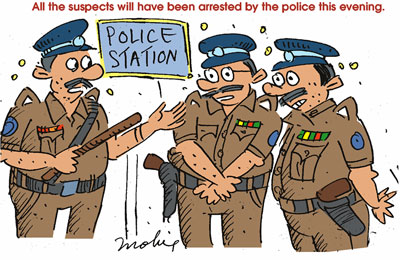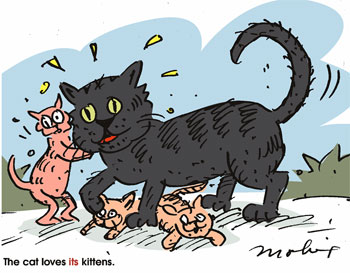|

by R. S. Karunaratne
Active and passive voice
Part 3
when we change an active voice sentence in the present perfect tense
to the passive voice, we have to change the verb accordingly.
Active voice: Manel has encouraged her children to learn English.

Passive voice: Manel’s children have been encouraged by her to learn
English.
AV: They have provided the refugees with food and clothing.
PV: The refugees have been provided with food and clothing.
AV: Fans have admired the talented singer.
PV: The talented singer has been admired by his fans.
AV: Raju has taken his father to hospital.
PV: Father has been taken to hospital by Raju.
AV: I have given money to them to buy stationery.
PV: They have been given money by me to buy stationery.
When we change an active voice sentence in the past perfect tense to
the passive voice, we have to change the verb accordingly.
AV: Srima had told Doreen to come early.
PV: Doreen had been told by Srima to come early.
AV: We had taken the injured man to hospital when his wife came.
PV: The injured man had been taken to hospital when his wife came.
AV: They had built the house according to the plan.
PV: The house had been built according to the plan.
AV: We didn’t know that the Examination Department had released the
results.
PV: We didn’t know that the results had been released by the Examination
Department.
AV: We had discussed Sam’s ideas on an earlier occasion too.
PV: Sam’s ideas had been discussed on an earlier occasion too.
When we change an active voice sentence in the future perfect tense
to the passive voice, we have to change the verb accordingly.
AV: By Sunday next week, they will have completed the course.
PV: By Sunday next week, the course will have been completed.
AV: By tomorrow evening, Carol will have written three essays.

PV: By tomorrow evening, three essays will have been written by Carol.
AV: By next year, we will have received the certificates.
PV: By next year, the certificates will have been received by us.
AV: By tomorrow evening, I will have sent all the messages.
PV: All the messages will have been sent by tomorrow evening.
AV: The police will have arrested all the suspects by this evening.
PV: All the suspects will have been arrested by the police this evening.
[Activity]
Correct the following sentences and check your answers with the key.
1. The refugees have provided with food by tomorrow morning.
...........................................................................
2. The ballet dancer admired by her fans.
............................................................................
3. A leading actor has arrested for smuggling drugs.
............................................................................
4. By the end of next week, the examiners will marked our papers.
............................................................................
5. The winners of the contest had announced.
............................................................................
6. Traffic laws have ignored some drivers.
............................................................................
7. The moulds for the bricks have designed by a foreigner.
............................................................................
8. By next month, all the classes will have cancelled.
............................................................................
9. Some old houses have already demolished.
............................................................................
10. Plans have made to put up a new building for the school.
............................................................................
Key:
1. The refugees will have been provided with food by tomorrow
morning.
2. The ballet dancer has been admired by her fans.
3. A leading actor has been arrested for smuggling drugs.
4. By the end of next week, the examiners will have marked our papers.
5. The winners of the contest had been announced.
6. Traffic laws have been ignored by some drivers.
7. The moulds for the bricks have been designed by a foreigner.
8. By next month, all the classes will have been cancelled.
9. Some old houses have already been demolished.
10. Plans have been made to put up a new building for the school.
Know your idioms
The meaning of idioms cannot be easily worked out from the words they
contain.
Therefore, an effort must be made to know the meanings of English
idioms. Do the following quiz and check your answers with the key.
1. Some undergraduates came late and broke the thread of the
lecturer’s argument.
(a) interrupted
(b) supported
(c) enlivened
2. You can depend on me. I never break my word.
(a) lie
(b) never break a promise
(c) forget
3. The boss is always breathing down our necks.
(a) lenient
(b) strict
(c) watching over
4. When the examination was over, we could breathe easily.
(a) enjoy
(b) relax
(c) work hard
5. The news of her death brought a lump to my throat.
(a) felt a sense of relief
(b) felt very happy
(c) felt very emotional
6. Having to earn his living will bring him down to earth.
(a) make him face reality
(b) make him happy
(c) make him unhappy
7. My friend’s death from lung cancer brought home to me the dangers
of smoking.
(a) made me happy
(b) made me sad
(c) made me realise
8. The new government will bring into being a new system of
education.
(a) destroy
(b) cause to exist
(c) postpone
9. The day’s programme was brought to a close with the National
anthem.
(a) ended
(b) started
(c) announced
10. Scientists have brought to light some interesting facts about
tsunami disasters.
(a) invented
(b) discovered
(c) tested
[Key]
1. (a) 2. (b) 3. (c) 4. (b) 5. (c) 6. (a) 7. (c) 8. (b) 9. (a) 10.
(b)
Starters:
Possessive pronouns
‘My, our, your, his, her, its, their’
Sometimes, beginners find it difficult to use ‘my, our, your, his,
her, its, their’ correctly. All these words show possession or
relationship. ‘My’ is the possessive form of ‘I’.
This is my book.
I like my job.
Do you know my sister?
How is my essay?
My work is over.
‘Our’ is the possessive form of ‘we’.

This is our school.
We do our work diligently.
Our job is to maintain discipline.
They don’t know our names.
We love our country.
‘Your’ is the possessive form of ‘you’.
Your handwriting is neat.
Your translation is horrible!
When do you visit your parents?
I know your name.
This is your room.
‘His’ is the possessive form of ‘he’.
His name is Rajakaruna.
I don’t know his address.
Do you know his email address?
I don’t like his style of writing.
Now he is washing his car.
‘Her’ is the possessive form of ‘she’.
Her name is Irangani.
Do you know her address?
This is her house.
Nobody knows her email address.
She loves her pets.
‘Its’ is the possessive form of ‘it’. This should not be confused
with ‘it’s’, the contraction of ‘it is’.
The dog wags its tail.
The cat loves its kittens.
Peradeniya is famous for its university.
The lion came out of its cave.
The tiger has lost its teeth.
‘Their’ is the possessive form of ‘they’.
They like their jobs.
They are living in their house.
These are their children.
Do you know their names?
They have their own views.
[Activity]
Fill in the blanks with ‘my, our, your, his, her, its, their’ and
check your answers with the key.
1. Namasivayam doesn’t like ............. job.
2. Do you like ................ job?
3. Does your brother like ............. job?
4. Mary is married. ............ husband works in a bank.
5. I know Carlton but I don’t know ............ wife.
6. Take ............ umbrella, it’s raining.
7. ............... favourite author is Bertrand Russell.
8. My father is a lawyer but I don’t like ............. job.
9. We are staying at a five star hotel. ............. room is very
comfortable.
10. Mr and Mrs Wijekoon live in Australia but .......... daughter lives
in England.
--------------
Key:
1. his 2. your 3. his 4. Her 5. his 6. your 7. My 8. his 9. Our 10.
their
--------------
Fun with proverbs
Proverbs contain the concentrated folk wisdom. Do the following quiz
and learn a new set of proverbs. Match the first part of the proverbs in
column ‘A’ with those in column ‘B’. Check your answers with the key.
[Column A]
1. There is many a slip ...
2. There is no smoke ....
3. Slow and steady ...
4. Speech is silver, ...
5. Call a spade ...
6. A rolling stone ...
7. Sugar is sweet ...
8. What is sauce for the goose ...
9. Jack of all trades ...
10. Time and tide ...
11. Any time ...
12. Do not play with ...
13. Once a thief ...
14. One good turn ...
15. Never trouble trouble ...
16. Set a thief ...
17. Empty vessels ...
18. All’s well that ...
19. All work and no play ...
20. Those who live in glass houses ...
[Column B]
A. a spade.
B. between the cup and the lip.
C. makes Jack a dull boy.
D. edged tools.
E. even in darkness.
F. deserves another.
G. gathers no moss.
H. make the most noise.
I. should not throw stones.
J. always a thief.
K. master of none.
L. wait for no man.
M. wins the race.
N. means no time.
O. is sauce for the gander.
P. till trouble troubles you.
Q. to catch a thief.
R. ends well.
S. silence is golden.
T. without fire.
Key:
1. B 2. T 3. M 4. S 5. A 6. G 7. E 8. O 9. K 10. L 11. N 12. D 13. J
14. F 15. P 16. Q 17. H 18. R 19. C 20. I
Nouns and verbs
Write the corresponding verb for each noun and check your answers
with the key.
1. Horror : ..........................
2. Joy : ............................
3. Memory : .........................
4. Mind : ...........................
5. Name : ...........................
6. Nation : .........................
7. Colony :..........................
8. Courage : ........................
9. Custom : .........................
10. Danger : ........................
11. Example : .......................
12. Force : .........................
13. Fraud : .........................
14. Friend : ........................
15. Fright : ........................
16. Glass : .........................
17. Glory : .........................
18. Gold : ..........................
19. Grass : .........................
20. Grief : .........................
Key:
1. horrify 2. enjoy 3. memorise 4. remind 5. nominate 6. nationalise
7. colonise 8. encourage 9. accustom 10. endanger 11. exemplify 12.
enforce 13. defraud 14. befriend 15. frighten 16. glaze 17. glorify 18.
gild 19. graze 20. grieve |

